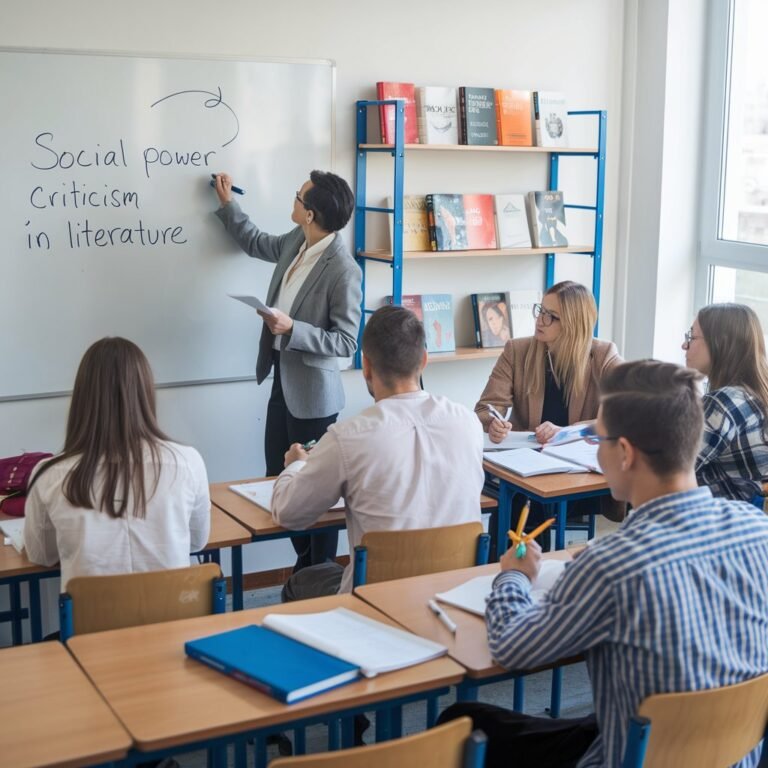Social power criticism in literature is an approach that examines how social power and influence shape stories, characters, and events. It looks at how certain groups in society—like the rich, the powerful, or the marginalized—are represented and treated in literature. By understanding this, we can see how books and stories reflect the world around us and even push for change. This type of criticism helps us ask important questions like: How do the powerful use their control? What happens to the weaker groups in society?
Through social power criticism in literature, we can explore the hidden meanings behind a story’s characters and their actions. Writers often use literature to comment on real-life power struggles, offering a mirror to society’s issues. Whether it’s about race, gender, or class, this form of criticism helps readers better understand the social dynamics and the ongoing fight for fairness. It reminds us that literature is not just about entertainment—it’s also a powerful tool for social change.
What is Social Power Criticism in Literature? Exploring Its Meaning and Impact
Social power criticism in literature is a way of studying books and stories to understand how power works in society. It looks at how the powerful, such as kings, politicians, or even large companies, use their strength to influence others. This criticism helps us see how different groups are treated in stories, especially those who are weak or oppressed. Writers often include these power struggles to show us what’s wrong in society.
By analyzing the stories, social power criticism in literature shows us the power relationships between characters. For example, we might see how a king treats his people or how a hero challenges the system. These stories often teach us about fairness and justice. They help readers ask important questions about what’s right and wrong in the world around us.
Key Points to Consider:
- Understanding power struggles in stories.
- How the powerful affect others.
- Learning about fairness and justice in society.
The Role of Power in Literature: How Social Power Criticism Shapes Our Understanding
Power plays a big role in many books. Social power criticism in literature helps us understand how power is used by different characters. Sometimes, characters with power use it to control others. Other times, they try to change the system to help people who are treated unfairly. By looking at how power is used, readers can understand more about how it works in real life.
Stories can also show how the powerless fight back. Characters who are weaker or oppressed might try to gain power through their actions. This can help readers think about their own actions and what they can do to make the world a better place. Literature often uses power as a way to explore deep ideas about society and fairness.
Examples of Power in Literature:
- Kings or leaders using their power for control.
- Heroes standing up for the weak or oppressed.
- The struggle between powerful and powerless groups.
Uncovering Hidden Messages: How Social Power Criticism Highlights Inequality in Stories
Many books have hidden messages about social power criticism in literature. These messages help us see how unfairness and inequality affect people in society. Writers often use characters to show how some groups are treated better than others. This type of criticism looks closely at these issues and helps readers understand what’s wrong.
In literature, inequality can show up in many ways. For example, a character might be treated badly because of their race, gender, or social class. These stories encourage readers to think about how they can help make things fairer in real life. By reading with an eye for power struggles, we can learn how to create a better society.
Signs of Inequality in Literature:
- Characters treated unfairly because of their background.
- The battle of the frail against the strong.
- How unfairness is shown through character actions.
The Power of Words: How Authors Use Social Power Criticism in Their Writing

Writers often use words carefully to show power in their stories. Social power criticism in literature helps us understand how authors choose to describe characters and events to reflect power differences. For example, words can make a character seem strong or weak, good or bad. The way these words are used can send a message about how power is used in society.
Authors may also use language to challenge the status quo. When they write about power struggles, they can make readers think about their own world. This is one of the reasons why literature is so important—it helps us see things from different perspectives and opens our eyes to problems we might not have noticed before.
Powerful Uses of Words:
- Describing powerful characters vs. weak ones.
- Showing social struggles through dialogue and action.
- How authors challenge the idea of power through storytelling.
Social Power Criticism in Literature: A Tool for Understanding Society’s Problems
Social power criticism in literature is a useful tool for looking at real-world issues through stories. By studying how power is shown in books, readers can better understand the problems people face in society today. This type of criticism helps us see the connections between the characters’ struggles and the real struggles people face in life.
In literature, power is often linked to issues like wealth, race, or class. By understanding these connections, readers can learn more about the way power works in society. These lessons can inspire change in the real world, encouraging people to think about how they can help make things better.
Understanding Real-Life Problems:
- The connection between stories and real-world issues.
- How power affects people differently based on race, class, or wealth.
- How literature inspires change and thought.
From the Margins to the Center: How Social Power Criticism Examines Group Dynamics
In many stories, certain groups are pushed to the margins. Social power criticism in literature helps us see how these groups are treated and how their experiences differ from the powerful ones. It looks at how some characters are ignored or oppressed, while others hold all the power. This criticism allows us to understand how these groups fight for their place in society.
By looking at how different groups are represented, we can see the challenges they face. Some groups, such as women or people of different races, are often shown as weaker or less important. Through social power criticism in literature, we can learn how these groups fight back and try to make their voices heard.
Key Groups Examined in Literature:
- Marginalized groups fighting for their rights.
- Women, minorities, and the oppressed characters.
- How power is used to either silence or amplify voices.
Social Power Criticism in Literature: Why It’s Important for Today’s Readers

Social power criticism in literature is important for today’s readers because it helps us understand the power struggles happening in our own world. By studying how power is used in books, we can better see the problems around us. Literature offers a way to explore these issues in a safe and thoughtful way, helping us think about how we can make positive changes.
The importance of this type of criticism cannot be overstated. It teaches readers to recognize inequality and think critically about the world they live in. By understanding how power works, readers can better understand how to challenge unfairness and fight for a fairer, more equal society.
Why It Matters Today:
- Helps readers see real-life issues through stories.
- Encourages critical thinking about fairness and equality.
- Offers ways to challenge unfair power structures in the real world.
Conclusion
Social power criticism in literature helps us understand how power affects people in stories and in real life. It shows how some groups are treated unfairly while others use their power to control. By reading these stories, we can learn about injustice and think about how to make the world a better place. Books are not just for fun, but also for learning about the world and how we can change it.
This type of criticism teaches us important lessons about fairness, equality, and justice. Social power criticism in literature encourages us to think deeply about how we treat others and how we can help those who are treated unfairly. It’s a valuable tool for understanding society and improving our actions to make things right for everyone.
FAQs
Q: What is social power criticism in literature?
A: It is a way of studying stories to understand how power is used and how it affects different people or groups in society.
Q: Why is social power criticism important?
A: It helps us understand how power is used unfairly and teaches us lessons about fairness, equality, and justice.
Q: How does literature show power?
A: Literature shows power through characters, actions, and conflicts, helping us see who holds power and how they use it.
Q: Can social power criticism help in real life?
A: Yes, it helps us recognize unfairness in the real world and think about how to make positive changes.
Q: What are some examples of power struggles in literature?
A: Kings ruling over people, heroes fighting against oppression, or weak characters struggling to gain power.

